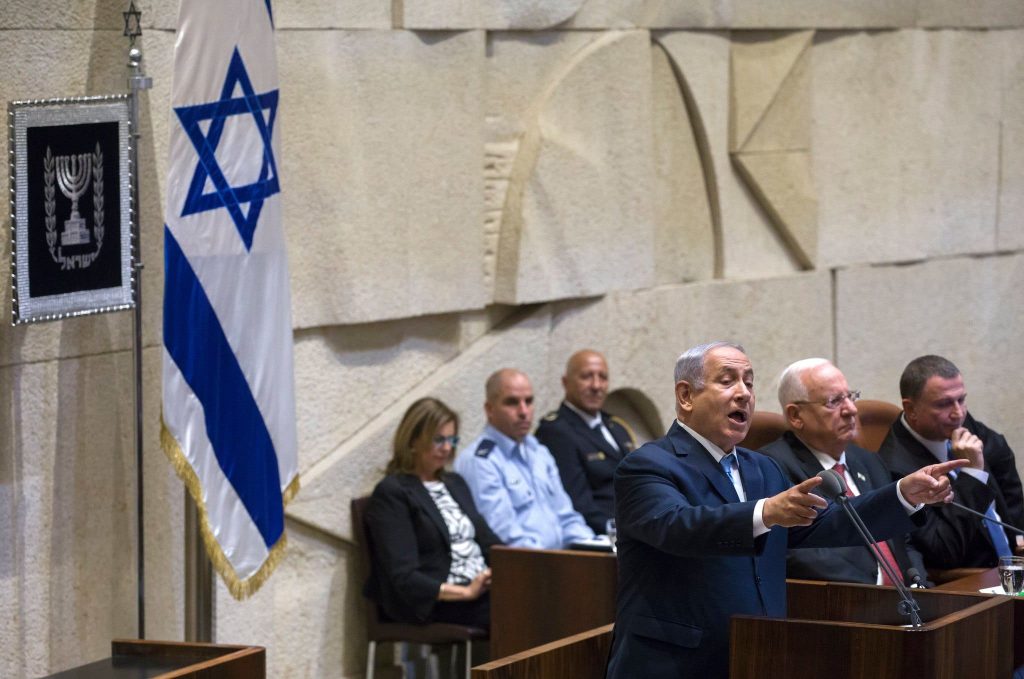
Israeli diplomats navigate a spectrum of strategies, from Erdan’s confrontational stance to Ezra’s nuanced pragmatism, amid heightened global scrutiny and internal political divisions.
APRIL 10, 2024

In the discourse surrounding Israeli diplomacy post October 7th, the predominant focus has been on conventional talking points aligning with the broader national interests and security of the Israeli state. These include a steadfast refusal to a ceasefire until Hamas is completely eradicated from the Gaza Strip, rendering them incapable of governing the region in the future, demands for a complete surrender by Hamas, the unconditional release of all hostages held by the group, and rejection of any unilateral declaration of a Palestinian state without prior negotiations with Israel. However, a comprehensive examination of the textual and visual discourse of various Israeli diplomats reveals a divergence in language and approach. This, potentially reflects how internal political divisions within Israeli society has permeated into diplomatic circles. Alternatively, this can also be interpreted as a nuanced diplomatic strategy, construed as an intentional adaptation to cater to the preferences of the target audience, in the host country and beyond.
In the aftermath of October 7th, a considerable portion of the media and international attention has focused on Israeli diplomats whose discourse aligns with the far-right extremist faction of Israeli politics and society. This alignment has elicited polarizing reactions, even from countries traditionally close to Israel. Among these figures, Gilad Erdan the Permanent Representative of Israel to the United Nations, stands out. Affiliated with the right-wing Likud party, led by current Prime Minister Benjamin Netanyahu, Erdan started his political activities in opposition to the Oslo Accords. Upon joining the Likud party, he secured multiple terms in the Knesset and held various government and cabinet positions. Notably, during his initial tenure as a Knesset Member, Erdan emerged as one of the most vocal critics within the Likud party regarding Israeli withdrawal from the Gaza Strip in 2005.
The discourse and approach of Gilad Erdan in his capacity as the Israeli representative at the UN has been marked speeches and statements that in many ways goes against the fundamental principles of diplomatic etiquette that guides nation states. Erdan has attracted considerable attention through a series of incidents, notably his public display of yellow star badges bearing the inscription “Never Again.” This action drew criticism not only internationally but also within Israel, spanning various political and societal sectors, including Yad Vashem, Israel’s official Holocaust memorial. Additionally, Erdan’s outspoken and condemnatory remarks directed at UN Secretary-General Antonio Guterres following Guterres’ acknowledgment of the historical context surrounding Hamas attacks on October 7th garnered further scrutiny. Erdan called for Guterres’ resignation, accusing him of condoning terrorism and making statements tantamount to justifying acts of terrorism and murder.
Another incident underscoring Erdan’s disregard for diplomatic protocol occurred during a Security Council meeting, where he engaged in undiplomatic and aggressive criticism of the spokesperson for UN Women. This behaviour led to Ambassador Erdan being interrupted mid-speech and reprimanded by the Permanent Representative of China, who presided over the Security Council at the time, reminding him of the need for civility and respect, even in disagreement. While Erdan has aligned his discourse with the Likud party within the present ruling coalition, his statements and actions, which have frequently criticized the legitimacy of UN-led multilateral diplomacy, mirror the isolationist foreign policy narrative of the far religious right faction within the current ruling coalition in Israel, that have come under global spotlight for their provocative remarks, and have been widely characterized as a fundamental obstacle to regional peace.
In contrast to the right-wing rhetoric espoused by Israeli diplomats such as Gilad Erdan, which resonates with the populist discourse of the current ruling coalition, a notable example of a diverging pragmatic approach within Israel’s diplomatic ranks can be observed at the Israeli Consulate General in close proximity to Israeli Mission to the UN in New York. Aviv Ezra, serving as Israel’s Acting Consul General in New York, presented an alternate discourse during an interview with veteran journalist Riz Khan for Al Arabiya English. Unlike Erdan, Ezra is a career diplomat and a recognized expert on Israel-United States relations. His discourse, upon analysis, underscores how opposition to Netanyahu extends to the diplomatic community, akin to other state institutions in Israel such as the military, civil services, and judiciary.
While it is expected that Consul General Ezra, prioritizing state interests above all else, would echo Israel’s red lines, he refrained from employing the extremist and undiplomatic language observed in some of his colleagues within the Foreign Ministry. During the interview, Ezra predictably reiterated the aforementioned talking points that align with ‘national interests.’ However, he did acknowledge that Israel’s military operations in the Gaza Strip ‘has an effect coming back from many friends’ which he attributed to a ‘clock ticking’, and the human suffering experienced by civilians in Gaza. This acknowledgment of criticism regarding the duration of violence and civilian casualties in Gaza is noteworthy, particularly against the backdrop of ongoing public rhetoric from the Israeli government emphasizing that there will be no pause in violence until an absolute victory and dismissing international pressure, in a bid to cater to their domestic audiences.
Among the various points made by the Consul General that merits attention, one particularly noteworthy statement made by him in response to a question regarding the conflation of criticism of Israel’s policies with anti-Semitism was his acknowledgment that “Half of Israel’s public opinion is against the government of Israel’s policy.” This statement by Ezra highlights the significance of distinguishing between officials who represent a state and those who represent a government, a dilemma evident within Israel’s diplomatic community.
Throughout his political career, Netanyahu has vehemently opposed the establishment of a sovereign Palestinian state, even, recently going so far as to assert that Israel must maintain control over the area “from the river to the sea.” This narrative, framing the conflict entirely as a zero-sum game between Israelis and Palestinians for absolute territorial control, has been echoed by numerous right-wing oriented Israeli diplomats A notable figure is Tzipi Hotovely, the Israeli Ambassador to the United Kingdom, who, like Gilad Erdan, is a member of Netanyahu’s Likud party, and is no stranger to controversy. Hotovely has faced scrutiny for her statements, drawing criticism from various quarters of the global media, civil society, and fellow diplomats. In an interview with Sky News in her capacity as Israeli ambassador, Hotovely explicitly rejected the two-state solution and voiced her opposition to the establishment of a Palestinian state, firmly stating, “The answer is absolutely no.” In contrast to this Consular General Ezra while criticizing the concept of a Palestinian state “from the river to the sea”, characterized the broader issue as a ‘matter of terminology’, voiced his advocacy for Palestinians to have full control over their own affairs, provided they undergo demilitarization to ensure they pose no threat to Israel. He also named the ‘Palestinian representatives’ in partnership with moderate Arab countries as one of the parties involved in “governing to 100% of their abilities, with 0% ability to threaten us”.
Another significant aspect of Consul General Ezra’s interview is his response to a question regarding the prospects for peace between Jews and Arabs. He expressed his belief in the eventual realization of peace between these communities, citing a personal anecdote about half of his family originating from Iraq, which according to him “ For many years lived there in peace, but they had to flee from Iraq when they were attacked”. Regardless of the specific language used or the manner of expression throughout the interview, it is important to acknowledge the backdrop of various criticisms levelled against Israeli policies, particularly concerning the language and terminology used when referring to Palestinian civilians, which some critics deem hateful and dehumanizing. Instances such as Ambassador Erdan’s endeavour to draw parallels between the Holocaust and Palestinian figures, or Ambassador Tzipi’s assertion that there is no humanitarian crisis in Gaza, underscore the sensitivity surrounding this issue. In this context, Consul General Ezra’s expression of hope for peace carries significant weight, particularly given his role as the Israeli representative in a city boasting one of the largest Jewish populations outside Israel, amidst a polarized environment both within Israel and globally.
Beyond the political divisions within Israel, which account for many of the contradictions and variations in the approach of foreign policy officials, may also stem from a calculated diplomatic strategy tailored to specific audiences depending on the country or region of focus. Such an approach can manifest in two extremes depending on the diplomats’ objectives and motivations. A pertinent example demonstrating the polarization of motivations within the Israeli diplomatic community can be observed in the Republic of Ireland and Belgium, two European Union member states that have criticized Israel’s military actions in the Gaza Strip and are among the very few that have called for an immediate ceasefire. The Israeli Ambassador to Ireland, Dana Erlich, serves in a nation with a longstanding history of solidarity with the Palestinian people, and for decades has been among the rare Western critics of Israeli policies. In this context, Ambassador Erlich while maintaining an adherence to the core talking points of Israeli diplomacy post-October 7th, also upholds the fundamental responsibilities inherent in any diplomatic portfolio and adapts her approach to align with the requirements and sensitivities of her host country. This strategic adjustment aims to mitigate any potential harm to bilateral relations between states.
In a series of interviews with the Irish media, Ambassador Erlich staunchly defends Israeli policies and military operations in Gaza. However, she also demonstrates a motivation to acknowledge and consider the prevailing public sentiment among the Irish populace. During these interviews, she openly acknowledges the civilian suffering in Gaza, particularly referring to the tragic death of a six-year-old Palestinian girl, Hind Rajab as ‘tragic’. Furthermore, she has been quoted as expressing understanding of the criticism against Israel. In a manner akin to Consul General Ezra, she characterizes anti-Semitism as an act of delegitimization rather than mere criticism of Israel.
In Belgium, the Israeli Ambassador, Idit Rosenzweig-Abu, a career diplomat, has faced significant criticism and global backlash due to her offensive diplomatic style. Her conduct has been notably undiplomatic, showing scant regard for the protocols and norms expected of diplomats, especially concerning issues that provoke intense polarization within her host country. Previously summoned by the Belgian Foreign Ministry over the Israeli bombing of a building belonging to the Enabel Belgian development agency in Gaza, Ambassador Rosenzweig-Abu has made a series of contentious statements. Notably, her remarks, which referenced a Belgian serial killer in criticizing a newspaper’s publication of images depicting Israeli and Palestinian prisoners side by side after their releases, drew criticism from Belgian politicians and victims’ families.
However, a recent comment of hers sparked widespread outrage on social media. Posted on X (formerly Twitter), she criticized the Belgian government for inviting a Muslim Imam to recite Quranic verses at an event in parliament. She further disseminated false information regarding the translation of the verses in Arabic, which could be construed as hate speech. It is worth noting that unlike her counterpart in Dublin, who seeks to appeal to broader public sentiment, the Israeli ambassador to Belgium appears to be attempting to align herself with the far-right anti-Muslim segment of Belgian and Western European society. This group shares a discourse of spreading misinformation and propaganda about Islam and Muslims, and opposes the current ruling government in Belgium. In the midst of a rise in Islamophobia in Europe, this represents a deliberate effort to capitalize on societal polarization within her host country.
In conclusion, it is anticipated that as the conflict in Gaza persists and Prime Minister Netanyahu remains in power, despite significant domestic disapproval, the observed variances in Israeli diplomacy will continue to intensify. Like other state institutions, Israeli diplomatic core is not immune to societal polarization.
A curated seletion of FA’s must-read stories.
Written By: SeungHawn Kim
Written By: RIZWAN RAFI TOGOO
Written By: MARCO MENDEZ
Written By: KRISHNA ACHNAF HERINDRA
Written By: BILLY AGWANDA
Written By: SURUTHI LENIN
Written By: BERK TUTTUP
Written By: ALEXANDER BERGH

Rizwan Rafi Togoo is a analyst and researcher specalizing in Middle Eastern Diplomacy and the geopolitics of Southeast Asia-Middle East interactions, focising on Malaysia and the Gulf Cooperation Council. He completed his Advanced Masters of Science in International Relations Diplomacy from Leiden University, which was jointly taught with the Netherlends Institute of International Relations.
Written By: BATUHAN GUNES
Written By: KRISTIN HYNES
Written By: ERIC SONG
Written By: ALEXANDER BERGH
Written By: KATE-REID SMITH
Written By: JOSEF SCHOEFL
Written By: PATRIC MCFARLAND
Written By: FATIH CEYLAN
FA’s flagship evening newsletter guilding you through the most important world streis ofthe day. Delivered weekdays.